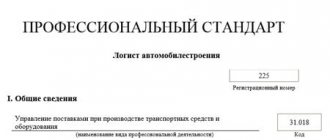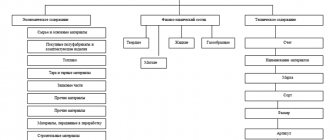Financial liability of the car driver,
employee, is regulated by Articles 238 - 250 of the Labor Code of Russia and Resolution of the Ministry of Labor of the Russian Federation of December 31, 2002 N 85 “On approval of lists of positions and work replaced or performed by employees with whom the employer can enter into written agreements on full individual or collective ( brigade) financial liability, as well as standard forms of agreements on full financial liability.”
1. General Provisions.
1.1. The employee (car driver) is obliged to compensate the employer for direct actual damage caused to him.
Direct actual damage is understood as a real decrease in the employer’s available property or deterioration in the condition of said property (including property of third parties located at the employer, if the employer is responsible for the safety of this property), as well as the need for the employer to make costs or excessive payments for the acquisition, restoration of property or compensation for damage caused by the employee to third parties.
1.2. Lost income (lost profits) cannot be recovered from the employee.
1.3. The employee's financial liability is excluded in cases of damage arising due to force majeure, normal economic risk, extreme necessity or necessary defense, or the employer's failure to fulfill the obligation to provide adequate conditions for storing property entrusted to the employee.
1.4. The employer has the right, taking into account the specific circumstances in which the damage was caused, to fully or partially refuse to recover it from the guilty employee.
1.5. For damage caused, the employee (car driver) bears limited financial liability within the limits of his average monthly earnings.
1.6. Articles 234 - 237 of the Labor Code of the Russian Federation regulate the employer’s liability to the employee
about causing material damage to him.
2. The employer’s obligation to establish the amount of damage caused to him and the cause of its occurrence.
Before making a decision on compensation for damage by specific employees, the employer is obliged to conduct an inspection to establish the amount of damage caused and the reasons for its occurrence. To conduct such a check, the employer has the right to create a commission with the participation of relevant specialists.
Requiring a written explanation from the employee to establish the cause of the damage is mandatory. In case of refusal or evasion of the employee from providing the specified explanation, a corresponding act is drawn up.
The employee and (or) his representative have the right to familiarize himself with all inspection materials and appeal them in the manner established by the Labor Code.
3. The procedure for collecting damages (Article 248 of the Labor Code of the Russian Federation).
3.1. Recovery from the guilty employee of the amount of damage caused, not exceeding the average monthly earnings, is carried out by order of the employer. The order can be made no later than one month from the date of final determination by the employer of the amount of damage caused by the employee.
If the month period has expired or the employee does not agree to voluntarily compensate for the damage caused to the employer, and the amount of damage caused to be recovered from the employee exceeds his average monthly earnings, then recovery can only be carried out by the court.
If the employer fails to comply with the established procedure for collecting damages, the employee has the right to appeal the employer’s actions in court.
3.2. An employee who is guilty of causing damage to the employer may voluntarily compensate for it in whole or in part. By agreement of the parties to the employment contract, compensation for damage by installments is allowed. In this case, the employee submits to the employer a written obligation to compensate for damages, indicating specific payment terms. In the event of dismissal of an employee who gave a written commitment to voluntarily compensate for damage, but refused to compensate for the specified damage, the outstanding debt is collected in court.
3.3. With the consent of the employer, the employee may transfer equivalent property to compensate for the damage caused or repair the damaged property.
3.4. Compensation for damages is made regardless of whether the employee is brought to disciplinary, administrative or criminal liability for actions or inactions that caused damage to the employer.
4. Full financial responsibility of the car driver.
It means the employee’s financial responsibility to compensate for direct actual damage caused to the employer in full.
4.1. According to the above documents, a car driver is not included in the list of positions with which an employer can enter into agreements on full financial liability. (with the normal nature of performing one’s direct duties).
4.2. At the same time, according to the resolution of the Ministry of Labor of the Russian Federation of December 31, 2002 N 85, work on the reception and processing for delivery (escort) of cargo, luggage, postal items and other material assets, their delivery (escort), issuance (delivery) falls under full financial responsibility. ). This means that the driver can bear full financial responsibility for the safety of the cargo he delivers if a freight forwarding agreement has been concluded with him or there is a corresponding entry in the employment contract. Combining professions in this case is carried out for an additional fee. The limits of liability are either full or partial, depending on the driver’s workload in the main profession and the amount of additional payment for the combination.
4.3. Financial liability in the full amount of damage caused is assigned to the employee in the following exceptional cases, different from the normal nature of the performance of his direct duties.
a) intentionally causing damage;
b) causing damage while under the influence of alcohol, drugs or other toxic substances;
c) damage caused as a result of the employee’s criminal actions established by a court verdict;
d) damage caused as a result of an administrative violation, if established by the relevant government body;
e) damage was caused while the employee was not performing his job duties.
5. The driver’s financial responsibility for the safety of the car.
A car is a tool of labor in production activities. Direct actual damage is understood as a real decrease in the employer’s available property or deterioration in its condition, as well as the need for the employer to make costs or excessive payments for the acquisition, restoration of property or for compensation for damage caused by the employee to third parties.
Here, the restoration of the employer’s cash property means the repair of a damaged car, and the property of third parties means commodity valuables (cargo), for which the employer is responsible. The driver does not bear financial liability in cases of damage due to force majeure, normal economic risk, extreme necessity or necessary defense, or the employer’s failure to fulfill the obligation to provide adequate conditions for storing property entrusted to the employee.
The driver may be held liable for damage to the vehicle in the exceptional cases listed in paragraph 4.3. of this article.
He can perform completely different functions and is assigned a lot of responsibilities. All details of the position must be specified in the employment contract and job description.
If we are talking about a person with a personal car, then, as a rule, he must not only deliver a passenger
– the direct owner of the car from point “A” to point “B”, but also monitor the cleanliness of the car inside and out, monitor the need for refueling and minor repairs. Maintenance and major repairs are not his responsibilities, since these operations are performed, or should be performed, by specialists.
A person driving a cargo transport must deliver what is entrusted to him from the point of departure to the destination, provide minor repairs on the road, and refuel the car. In addition, his obligations include monitoring loading and unloading.
It can also predict the behavior of the cargo during transportation
and help position it correctly on the trailer floor to avoid possible damage.
The driver-forwarder, in addition to the responsibilities listed above, also has the following additional duties: checking the quality and quantity of what is loaded and unloaded according to accompanying documents - waybills; checking and monitoring the integrity of the packaging (NOT CONTENTS); ensuring transportation regime (relevant for food and hazardous substances); registration of documents and reports of shortages, damage or other harm.
There are also limits
The driver's profession, like most others, is financially responsible. True, there is no need to talk about this in relation to this type of activity.
According to legislative acts - the Labor Code and Resolution 85 of the Ministry of Labor, this type of obligation can be applied in exceptional cases (these cases are listed in Article 243 of the Labor Code). Therefore, the limits of damage that a person driving a car can and should compensate for depend on the size of his average official earnings.
There are two exceptions to the rule:
- The person is given material assets - cargo according to some special document.
This may be a power of attorney, a deed of acceptance, or another similar document. It was by signing this paper. The employee of the organization responsible for transportation assumes obligations not only for delivery, but also for the preservation of valuable property received for transportation. But there is one caveat: if in the TD the position for which the employee is hired is not formulated as “forwarder” or “driver - forwarder,” then no one will be able to force the employee to accept the cargo under his signature and be fully responsible for it. His signature is his voluntary consent. - The person is a freight forwarder
. Due to the fact that the work of a freight forwarder involves working with material assets, their transportation, storage, and accounting, the employer’s requirement to be responsible for the safety of the entrusted cargo is completely justified and does not contradict the law. But again, such an employee must be registered at the enterprise correctly, and in addition to the employment contract, a contract on financial responsibility for the car must be concluded.In this case, the job description cannot contain general definitions and it is necessary to spell out in great detail exactly what functions the employee must perform and what he must know.
Only in the presence of these two circumstances can we talk about the onset of full financial liability. In other cases it is general.
https://youtu.be/ku8KizucEyE
Job description of a driver on the road
- Before setting off, he must check the correctness of all documentation for the transported cargo. Particular attention is also paid to its condition, integrity of packaging, correctness and reliability of placement in the car body. If damage is detected, appropriate notes are made on the waybill.
- At the preparation stage, the driver must make sure that there are no technical problems with the vehicle, which means it is fully ready for the trip.
- Until the driver arrives at his destination, he is prohibited from leaving the car unattended, using it for additional income, or giving rides to strangers.
Attention! All precautions are aimed at ensuring that cargo is delivered to its destination quickly and efficiently. In case of damage, the cost of losses is usually recovered from the person who drove the vehicle during transportation.
Responsibility for safety includes shortages. But! It is almost impossible to have the driver accept the cargo for each item, because it takes a lot of time to verify the quantity of goods with what is indicated in the invoice. In addition, not everyone has knowledge of product range. It was decided to use another method of dealing with shortages: the driver is obliged to deliver the specified number of packages to the destination without damage, without violations of labeling and packaging. All this is verified upon delivery.
What exactly is the MO of this position?
Now let’s figure out what a person is responsible for while driving and whether he can be responsible. It could be:
- Technical condition of the vehicle;
- Safety and quality of transported items.
Moreover, the employer’s demands to repair a company car at the employee’s expense are completely unreasonable and unlawful. It occurs if the damage occurred due to the cases described in the Labor Code.
Namely: the person was drunk, under narcotic or toxic influence; the damage was caused intentionally (by intent, or qualified as an administrative offense or crime); the employee used the car outside of working hours or for his personal purposes.
Only in these cases can you demand full compensation for the damage caused. But if it turns out that he was simply careless, or the malfunction did not occur through his fault, then we can talk about a maximum of general liability - that is, the damage will be estimated at one average monthly official earnings.
Now about the cargo itself
.
The person who controlled the loading, closed the body and put the seal does not have to do anything other than deliver the cargo. The forwarder is another matter.
Since the cargo is accepted according to invoices, warehouse documents, and a power of attorney, the employee is fully responsible for any shortage that is discovered during unloading.
During the transportation of cargo, only the forwarding driver has contact with it, and therefore all the demand comes from him. For damage to cargo due to incorrect transportation conditions - incorrect or inconsistent temperature, pressure, lack of ventilation, longer transportation period, etc., the forwarder is also liable.
If during transportation the packaging of the cargo, if any, is damaged, and, consequently, the contents themselves, then the demand also comes from the driver.
If all transportation conditions have been met, the packaging containers and material are intact, then the forwarder is not responsible for damage inside them. Since his responsibilities do not include control over the packaging of valuables
, so he cannot be responsible for this.
Now let's look at an example. Many companies engaged in transport and forwarding activities are trying to shift the lion's share of their obligations onto the shoulders of ordinary drivers who are not on their staff and with whom an agreement has not been concluded on the driver's full individual training for transported items.
It should be noted that with this type of activity the chain “shipper – driver” is extended by an indefinite number of links due to the fact that between these components there is a certain number of transport and forwarding intermediaries.
It is these intermediaries that conclude an application agreement with the owners and carriers
for cargo delivery, in which, in addition to standard conditions (loading/unloading points, cargo characteristics, transportation conditions, payment, vehicle and driver data), the driver is assigned (without giving him the function of a forwarder) to be fully responsible for damage.
Area of responsibility
- Condition and serviceability of the vehicle;
- Integrity and quality level of transported property (cargo).
However, the employer does not always have the right to demand repairs of the vehicle at the employee’s expense. This is possible in cases where the breakdown occurred in a number of cases clearly described in labor legislation.
For example, the driver was drunk and damaged the car, or knowingly contributed to the breakdown of the vehicle, or used the car for personal purposes or during non-working periods. If the damage occurred through no fault of his own or by accident, then such a loss is usually limited to one average monthly salary of the driver.
If we are talking about the responsibility of the forwarding driver, then such an employee is fully responsible for all damage to property during its transportation, including the integrity of packaging, delivery delays, and improper mode of transportation of goods.
Preparation of contract
There is one rule when drawing up: The employer’s responsibility cannot be underestimated, and the driver’s responsibility cannot be overstated. It must comply with the law (Article 232 of the Labor Code). Also, this document can determine specific cases in the event of which the damage will have to be compensated in full.
The following sections should be available:
- Preamble – names of the parties, place and date of conclusion;
- Subject – definition of responsibilities;
- Rights and obligations of the employee and the employer - here are indicated all the functions that the worker must perform, as well as those functions in which he can take part in order to control the work with values;
- Methods for determining the amount and recovery of damage caused;
- Exceptional circumstances
are the absence of proven guilt or the occurrence of circumstances due to which the citizen was unable to ensure the safety of the cargo and which did not depend on him; - Methods of dispute resolution – options for judicial and pre-trial settlement of disputes;
- Signatures and seals of the parties.
The more detailed each section is described, the less difficulties there will be in collecting. You can download the documents.
Restrictions
Typically, an employee compensates for losses caused to the company within the limits of average monthly earnings (Article 241 of the Labor Code of the Russian Federation). In addition, there are cases requiring compensation for the cost of actual losses of the organization (Article 243 of the Labor Code of the Russian Federation). Accordingly, the first case is limited, and the second is full financial liability.
In accordance with the Labor Code of the Russian Federation, a written agreement on full financial responsibility is concluded if:
- the employee is 18 years old;
- labor responsibilities are associated with monetary and commodity values;
- The position (work performed) of the employee is named in the “List of positions and work for which full financial liability may be applied” (Resolution of the Ministry of Labor dated December 31, 2002 No. 85).
The position of driver is not included in the List. However, it does include the position of collection driver and forwarder.
Consequently, an agreement on full financial responsibility for a car can be concluded only when combining the functions of driving a vehicle with the functions of a collector (collection drivers) or delivering goods (forwarding drivers). An example of such a solution can be found below.
I. Sources of legal regulation of workers’ liability
In the theory of law, legal responsibility is defined as the obligation of a person to endure certain deprivations of a state-authoritative nature, provided for by law, for an offense committed. Liability can be directed at the person of the violator (personal liability) or at his property (property liability). The financial liability of the parties to labor relations, in particular employees, is one of the types of property legal liability. General rules on the scope, cases and procedure for bringing workers to liability, the conditions for its limitation and features are contained in Chapter. 39 Labor Code of the Russian Federation. A number of narrow issues about the specifics of workers’ financial liability are regulated by by-laws. Examples of such regulations are, in particular, Resolution of the Government of the Russian Federation of November 14, 2002 No. 823 “On the procedure for approving lists of positions and work replaced or performed by employees with whom the employer can enter into written agreements on full individual or collective (team) material liability, as well as standard forms of agreements on full financial liability", Resolution of the Ministry of Labor of the Russian Federation of December 31, 2002 No. 85 "On approval of lists of positions and work replaced or performed by employees with whom the employer can enter into written agreements on full individual or collective ( brigade) financial liability, as well as standard forms of agreements on full financial liability” and others.








